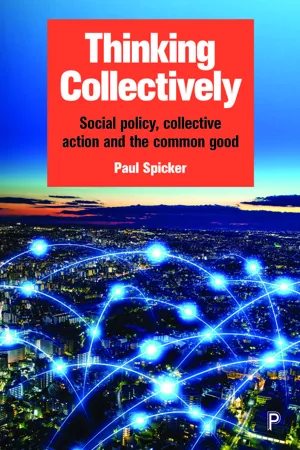Politics & International Relations
collectivism
Collectivism is a political ideology that emphasizes the importance of the collective over the individual. It advocates for the ownership and control of resources and means of production by the community or state, rather than by individuals or private entities. Collectivism is often associated with socialist and communist political systems.
Written by Perlego with AI-assistance
Related key terms
Related key terms
1 of 4
Related key terms
1 of 3
3 Key excerpts on "collectivism"
- eBook - ePub
- John Smithin(Author)
- 2008(Publication Date)
- Routledge(Publisher)
3 (This, in turn, seems to be why Keynes was keen to stress the ultimate compatibility of macroeconomic policy with this tradition, as already indicated.)collectivism on the other hand, is the political theory that stresses identification with the group or collective in politics, which can be variously defined along the lines of class, party, race, gender, nationality, religious affiliation or any other such line of demarcation. On this view, the individual should subordinate private interests to group solidarity, be prepared to make sacrifices on behalf of the group, accept the opinions and values of the group as a whole as their own and so on. The politics that arises will then clearly be group politics, involving the assertions of the rights and/or grievances of certain groups/collectives in society versus those of other groups, rather than individual rights and freedoms.Clearly, it would be possible to put both a positive and negative spin on either of these stances. The individualist can be portrayed as self-reliant, independently minded, principled and so on, but also as selfish and uncaring of the sufferings of others. The collectivist can be portrayed as altruistic, but also subject to “group think”, lacking in independent judgment and willing to discriminate against, or allow individual injustices towards, all persons who are not part of the favored group. Perhaps somewhat ironically, however (“ironically” only because of her general reputation as being well to the left of the political spectrum), Joan Robinson (1962, 11) very neatly sums up what must be the obvious conclusion to any such political debate, as follows: “A society of unmitigated egoists would soon knock itself to pieces; a perfectly altruistic individual would soon starve.” (Many such telling one-liners are actually scattered throughout Robinson’s work – another line from the same volume that seems to “sum it all up” on a slightly different issue, is the classic: “the misery of being exploited by the capitalists is nothing to the misery of not being exploited at all”.)4 - eBook - ePub
Thinking Collectively
Social Policy, Collective Action and the Common Good
- Spicker, Paul, Paul Spicker(Authors)
- 2019(Publication Date)
- Policy Press(Publisher)
PART I collectivismcollectivism is a set of ideas, principles and approaches that begin from the recognition of the collective aspects of social life. Where individualism views actions, decisions and policies from the perspective of independent, single actors, collectivism focuses on social groups, communities and the wider society.In Reclaiming individualism, I made a case for social and government action in order to protect and enhance the conditions of individuals.1 The argument of that book was based on a distinctive analytical framework, outlining three discrete approaches to individualism: moral, methodological and substantive. Substantive individualism is based in the belief that all actions are the actions of individuals, and that every social or political action is taken by individual human beings. Methodological individualism reviews economic, social and political arguments as if they are based in the decisions of people one by one; the actions of groups are understood as a whole series of individual actions, added together. (This is the characteristic approach of economic theory.) The case for methodological individualism has been argued with some force, but whether it applies depends on circumstances; sometimes it works, sometimes it does not. The most compelling arguments for individualism are moral.As a moral position, individualism is built around the defence of each and every person: individuals have rights, and every person matters. There is a very strong case to emphasise the role of individualism in the protection of individual dignity, rights and the value of every human being.In the consideration of collectivism, by contrast, the strongest arguments for a collective approach are substantive, and that is where this book begins. Substantive collectivism is the idea that we live not as ‘individuals’, but as the members of social groups, like families, neighbourhoods and communities, and that many of our actions are done together with others in organisations, such as schools and businesses, and social institutions. People are what they are, and who they are, because they live and have relationships with other people. Families, households, communities, organisations and nations can all be treated as social units, which have interests, concerns and priorities that might be different from those of the individuals who make them up. - eBook - ePub
Coffee Activism and the Politics of Fair Trade and Ethical Consumption in the Global North
Political Consumerism and Cultural Citizenship
- Eleftheria J. Lekakis(Author)
- 2013(Publication Date)
- Palgrave Macmillan(Publisher)
4 In Politics I Trust: Individualisation and the Politics and Pleasures of the SelfCollective action and political consumerismA lot of people regard activism as an all-or-nothing epic struggle against injustice. They get easily disappointed when they encounter resistance or apathy, because they believe that activism is about big changes that matter. Occasionally, activism is indeed about big changes that matter. More often, however, activism is about little changes that no one notices, but matter anyway. . .. One thing you could do is pledge to buy all your coffee from someone. . .[who] offers coffees that are. . .fair trade, which means that local communities around where the coffees are grown get a little bit more of a just economic compensation for their sacrifice. That’s what activism is about. . .. Activism is about living in an awful world, and learning how to stop contributing to it being quite so awful, quite as much as you have, little by little, step by step, on your own, when no one else is looking.(The Green Man1 )Can one person (making ethical purchases) make a difference? Or does (ethical consumer) action need to be collective? The answer depends on the movement or mobilisation and the targets of the particular type of activism. Collective forms of political organisation are changing the landscape of solid political culture. In the sociological tradition, the fall of collectivism has been heralded, along with the rise of individualisation.2 Political participation is becoming target oriented; this has a variety of consequences including citizens’ connection with parliamentary politics being confined to their exercise of the right to vote, while partisanship has been decreasing (Chapter 3 ), and the expansion of new social movements as a result of their affiliation with specific issues of social and environmental contention. How we understand activism today resonates with the historical accumulation of the networking of old and new movements spurring across the global South and North. Political contention was evident, in the pre-war era, as collective action in civil rights or class movements (Tilly, 2004) and, after the world wars, in the exponential issue-based so-called new social movements.3 Ethical consumption or political consumerism can be compared to the narratives of new social movements, in the sense that it shares the address of an issue-based type of activism. Such phenomena are intrinsically mobilising individuals in acts of consumption, and, as such, they epitomise individual behaviour. If politics is internalised due to institutional pressures, the outcome is a retreat from the public space, which is evident in the aforementioned decreasing numbers of electoral turnout (Chapter 3
Index pages curate the most relevant extracts from our library of academic textbooks. They’ve been created using an in-house natural language model (NLM), each adding context and meaning to key research topics.
Explore more topic indexes
Explore more topic indexes
1 of 6
Explore more topic indexes
1 of 4


